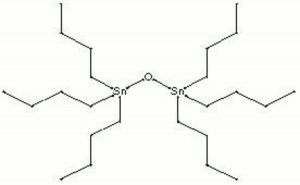Difference between revisions of "Tributyl tin oxide"
Jump to navigation
Jump to search
(username removed) |
m (Text replace - "== Authority ==" to "== Sources Checked for Data in Record ==") |
||
| Line 41: | Line 41: | ||
G.Caneva, M.P.Nugari, O.Salvadori, ''Biology in the Conservation of Works of Art'', ICCROM, Rome, 1991. | G.Caneva, M.P.Nugari, O.Salvadori, ''Biology in the Conservation of Works of Art'', ICCROM, Rome, 1991. | ||
| − | == | + | == Sources Checked for Data in Record == |
* G.Caneva, M.P.Nugari, O.Salvadori, ''Biology in the Conservation of Works of Art'', ICCROM, Rome, 1991 | * G.Caneva, M.P.Nugari, O.Salvadori, ''Biology in the Conservation of Works of Art'', ICCROM, Rome, 1991 | ||
Revision as of 21:25, 1 May 2016
Description
A organometallic tin compound that has been used as an algicide and fungicide. Tributyl tin oxide (TBTO) has been tried as a wood preservative for brown rot fungi and insects but it was found to leave stains. TBTO has also been used to treat algae and lichens on stone and mural paintings (Caneva et al 1991).
Synonyms and Related Terms
tri-n-butyl tin oxide; TBTO [Merck]; Thaltox [Wykamol, Ltd.]; hexabutyl distannoxane
Other Properties
Insoluble in water.
| Composition | C24H54OSn2 |
|---|---|
| CAS | 56-35-9 |
| Density | 1.17 |
| Molecular Weight | mol. wt. = 596.08 |
| Boiling Point | 180 |
Hazards and Safety
Toxic. LD50=87-200 mg/kg Contact may cause irritation. Flash point = 232 C
Fisher Scientific: MSDS
Additional Information
G.Caneva, M.P.Nugari, O.Salvadori, Biology in the Conservation of Works of Art, ICCROM, Rome, 1991.
Sources Checked for Data in Record
- G.Caneva, M.P.Nugari, O.Salvadori, Biology in the Conservation of Works of Art, ICCROM, Rome, 1991
